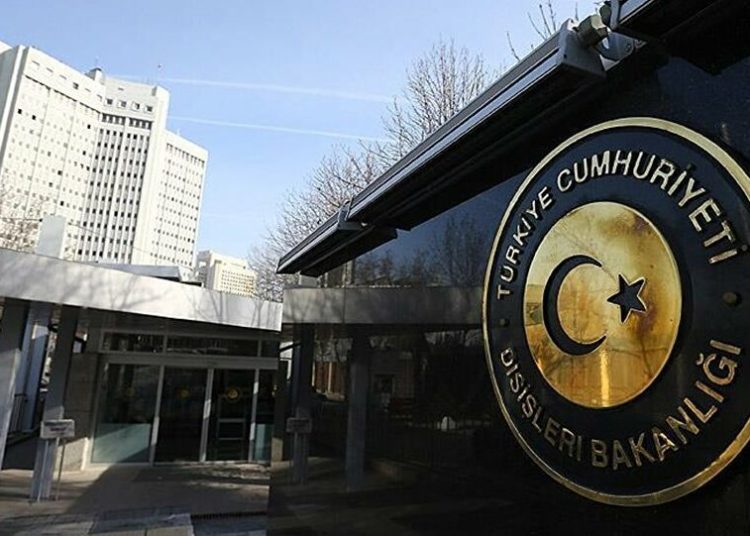Nordic Monitor
A secret wiretap has revealed that an associate of Saudi businessman Yasin al-Qadi asked President Recep Tayyip Erdoğan’s chief of cabinet, Hasan Doğan, to assist in the promotion of a Turkish diplomat who was serving as consul general in the Saudi city of Jeddah at the time.
Yasin al-Qadi is an Egyptian-born Saudi national who was at one time flagged by the US Treasury and the UN al-Qaida sanction committee. Al-Qadi was later removed from the UN list, followed by the US Treasury delisting his name.
According to a transcript obtained by Nordic Monitor, Doğan received a call from Osama Qotb, the nephew of Egyptian cleric Sayyid Qutb, a founder of the Muslim Brotherhood, on March 28, 2012 at 23:47 hours. Qotb, acting on behalf of al-Qadi, requested the help of Erdoğan’s chief aide in the appointment of the Turkish consul general in Jeddah to the higher position of ambassador.
According to the consulate’s web page, Salih Mutlu Şen had served as consul general in Jeddah between August 2008 and September 2012. The secret wiretap exposed Şen’s links to al-Qadi, who was living in Jeddah during his tenure.

Doğan said on the phone that Şen should wait for a while since Saudi Arabia had not sent an ambassador to Ankara and that the kingdom’s main diplomatic position in Turkey had been vacant for almost a year. “His appointment as ambassador would be possible following the appointment of a Saudi ambassador in Ankara. … It would not be appropriate to appoint a second ambassador in Saudi Arabia while it [Saudi Arabia] is represented by a chargé d’affaires,” Doğan stated.
Secret wiretap transcript of a call between Qutb and Doğan:
In 2015 Turkey’s ruling Justice and Development Party (AKP) appointed Şen as Turkey’s permanent representative to the Organization of Islamic Cooperation (OIC) based in Jeddah. Ambassador Şen submitted his letter of credence to OIC Secretary-General Iyad Ameen Madani on August 2.

The consulate general in Jeddah has become an important mission in the Turkish foreign service due to Erdoğan’s private relations with al-Qadi. Following the end of Şen’s tenure in August 2012, a childhood friend of President Erdoğan, Fikret Özer, was sent to Jeddah. Özer attended the İstanbul İmam-Hatip Lisesi, a religious public school, together with Erdoğan in the 1970s.
According to another wiretap recorded in 2013, Egemen Bağış, the then-EU affairs minister and current Turkish ambassador in Prague, told Reza Zarrab, an Iranian money launderer, that Özer was engaged in selling Turkish citizenship to Afghan residents of Saudi Arabia for $100,000 during his posting in Jeddah.
Bağış was one of four ministers forced to resign on December 25, 2013 after the revelation of two corruption investigations on December 17 and 25 in which the inner circle of then-Prime Minister Erdoğan were implicated. He was accused of accepting bribes from Zarrab in a sanctions-busting scheme run through Turkish state-owned Halkbank to circumvent US sanctions on Iran. He received $1.5 million from Zarrab. Bağış also helped Zarrab evade the bureaucracy in his dealings and assisted Zarrab’s father in acquiring a Schengen visa from the Italian Embassy in Ankara.

Nordic Monitor previously reported how President Erdoğan appointed his close friend and classmate Özer, in 2017, as ambassador to Qatar, a tiny Gulf nation that has become a close ally and strategic partner of Turkey over the last decade thanks to the policies of Turkey’s Islamist government. As part of his secret mandate, Özer has cultivated relations with Muslim Brotherhood representatives and several radical Islamist figures based in Qatar. In addition to Yusuf al-Qaradawi, the spiritual leader of the Brotherhood, Ambassador Özer has met with the former leader of Hamas, Khaled Mashaal, during his time in Doha.

Al-Qadi was on the UN and US lists and was barred by law from entering Turkey or investing in any business pursuant to UN Security Council resolutions 1267 and 1989 concerning al-Qaeda and associated individuals and entities when secret meetings were held between Erdoğan, the then-prime minister, and al-Qadi, with the chief of cabinet arranging the meetings between the two. Al-Qadi secretly entered Turkey multiple times and also met with Hakan Fidan, the head of Turkish intelligence agency MIT.
Al-Qadi, Doğan and Erdoğan’s son Bilal were all leading suspects in a corruption investigation pursued by prosecutors in Istanbul and were the subjects of detention warrants issued on December 25, 2013 by the prosecutors. However, Erdoğan stepped in, illegally preventing the execution of the warrants by ordering the police to ignore the prosecutors’ orders. After the removal of the prosecutors and police chiefs who were involved in the investigation, Erdoğan managed to whitewash the crimes of his associates.
Moreover, Erdoğan made repeatedly supportive remarks about al-Qadi and defended his advisors and party members’ relationship with the Saudi businessman, saying: “I know al-Qadi, and I believe in him as much as I believe in myself. He is a benevolent lover of Turkey and has investments here. It is impossible that he is connected to terrorism.”












